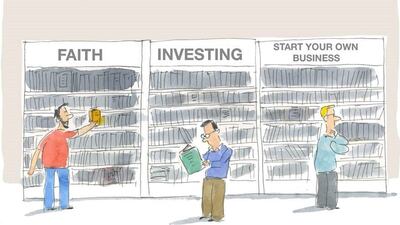Heard the one about the Arab, the Asian and the Westerner?
The Arab banks on God's grace, the Asian puts faith in every type of financial policy going, and the Westerner relies on his government back home.
Sorry. No punchline.
I believe there’s a millennial backlash against how their parents handle money. The case studies I met this week embody this, and it is their approach that is summarised in the above statement.
It goes against what I’ve been told for years -those selling financial products have told me that different nationalities have similar approaches to personal finance and savings:
Asians put every penny possible in savings funds earmarked for their children’s education.
Westerners do a bit of everything – with money put towards pensions, savings funds for children and life insurance.
The Arab contingent does none of the above.
Of course this is a gross generalisation. But now I have met the embodiment of these approaches for each nationality group. Except that there’s a twist: the people I met are the antithesis of their parents’ money philosophy.
There appears to be a flip in financial behaviour. The millennial Westerner no longer puts money into various pots of life: a bit for now, for later, for children. Instead, the approach is to take a chance in the UAE, build up a business with the aim of living off the proceeds in the future. If it goes belly-up, they’ll go back home where their government will look after them (the people I met are Scandinavian so they’re sorted – their welfare state will look after them, should there be a need).
The Asians have first-hand knowledge of what life can throw at you – in their case, debilitating illness of the only parent working meant no breadwinner for the family. Money stockpiled in education funds and nothing else meant no health insurance, or critical illness cover, or protection of any sort. Which meant cash was scarce. This had a huge impact on them. These millennials save every penny possible, take out multiple insurance policies for every imaginable eventuality, are cash-rich and debt-free, with no children to boot, so no need for any spend on education for offspring.
The Arab still does nothing in the way of taking out policies, but he too is polar-opposite to his father’s approach. His parents didn’t have policies, but paid for everything in cash. Saving up was a way of life. There was no other way to be. He, on the other hand, relies on installment options for his children’s school fees, has no savings, and has just increased his risk factor by starting up an e-commerce business on the side. The hope is it’ll generate cash-flow to fund life.
Will he save for his three young one’s tertiary education? No. When the time comes, it’s up to them to figure out how to fund it, if going to university is what they decide is best.
He’s probably an exception in this regard – with most Arabs viewing education as a passport to freedom. But his approach to spend what’s in hand and have faith is typical of his friends’ outlook.
Rebelling against their parents is not the only thing they have in common.
The three of them believed that enterprise will bring about their fortune. This is true for the Asian couple – they can retire today, age 30. Why? Because they have saved every penny possible, have never taken out debt – no mortgage, or credit card for them, and are insured to the hilt. They own 2 houses in the UAE and another elsewhere, have stocks and shares in various markets, and can walk away from their working life any time.
The other two will have a harder time – the Western couple have overheads, have just taken on a mortgage for a million dirhams, and are sinking the cash from the sale of the flat their parents gifted them as a down-payment. But they have the ultimate safety net of going back home and being looked after. Something the Arab doesn't have. He is the most vulnerable - with zero savings, huge obligations, and now increased risk with the online business he's set up.
I wonder what their parents think about these lifestyle choices, and whether they will look back at the patterns laid down in childhood and lament.
Heard the one about millennials rebelling against their parents?
It extends to money too.
Nima Abu Wardeh is a broadcast journalist, columnist and blogger. Share her journey on finding-nima.com

